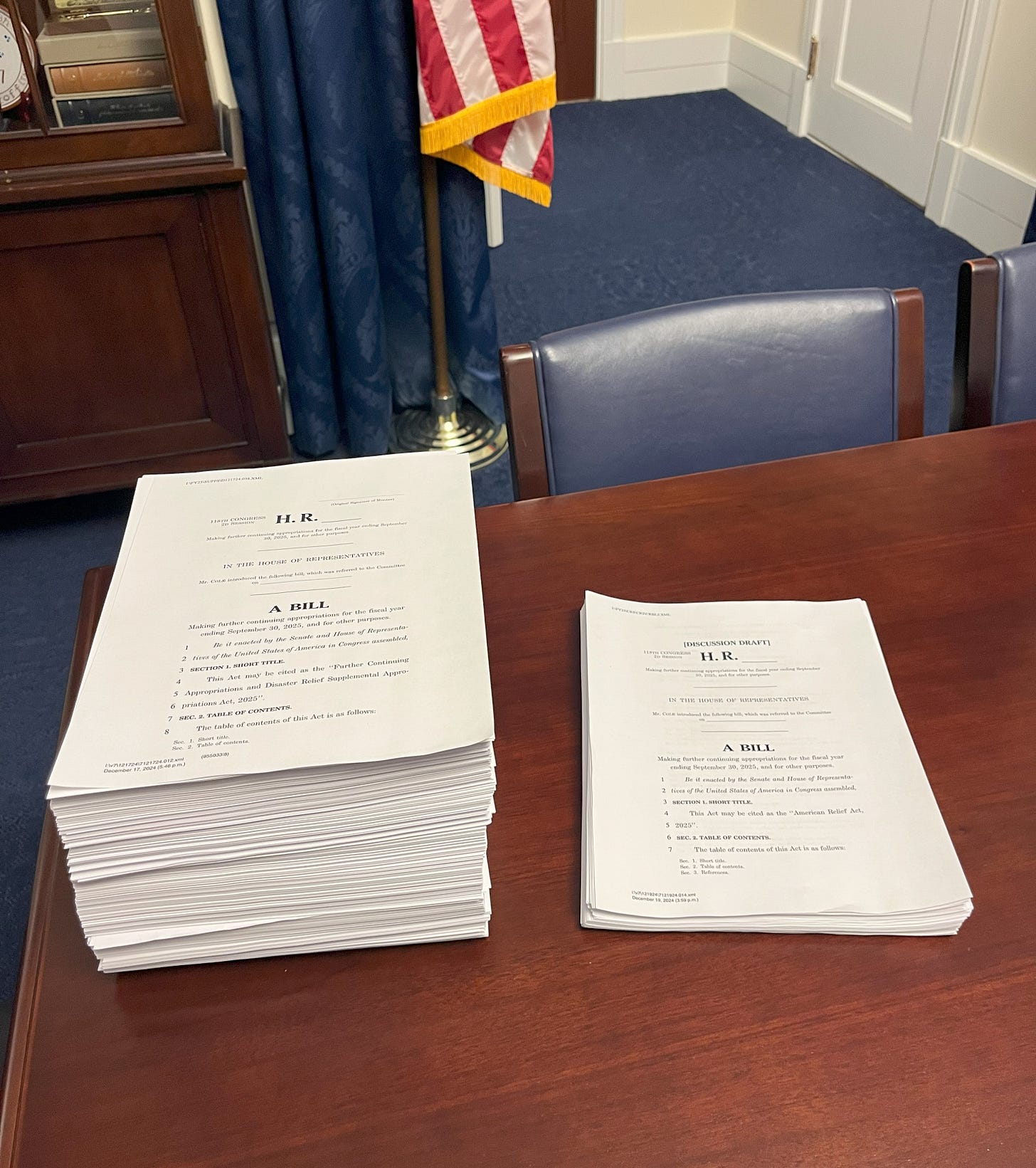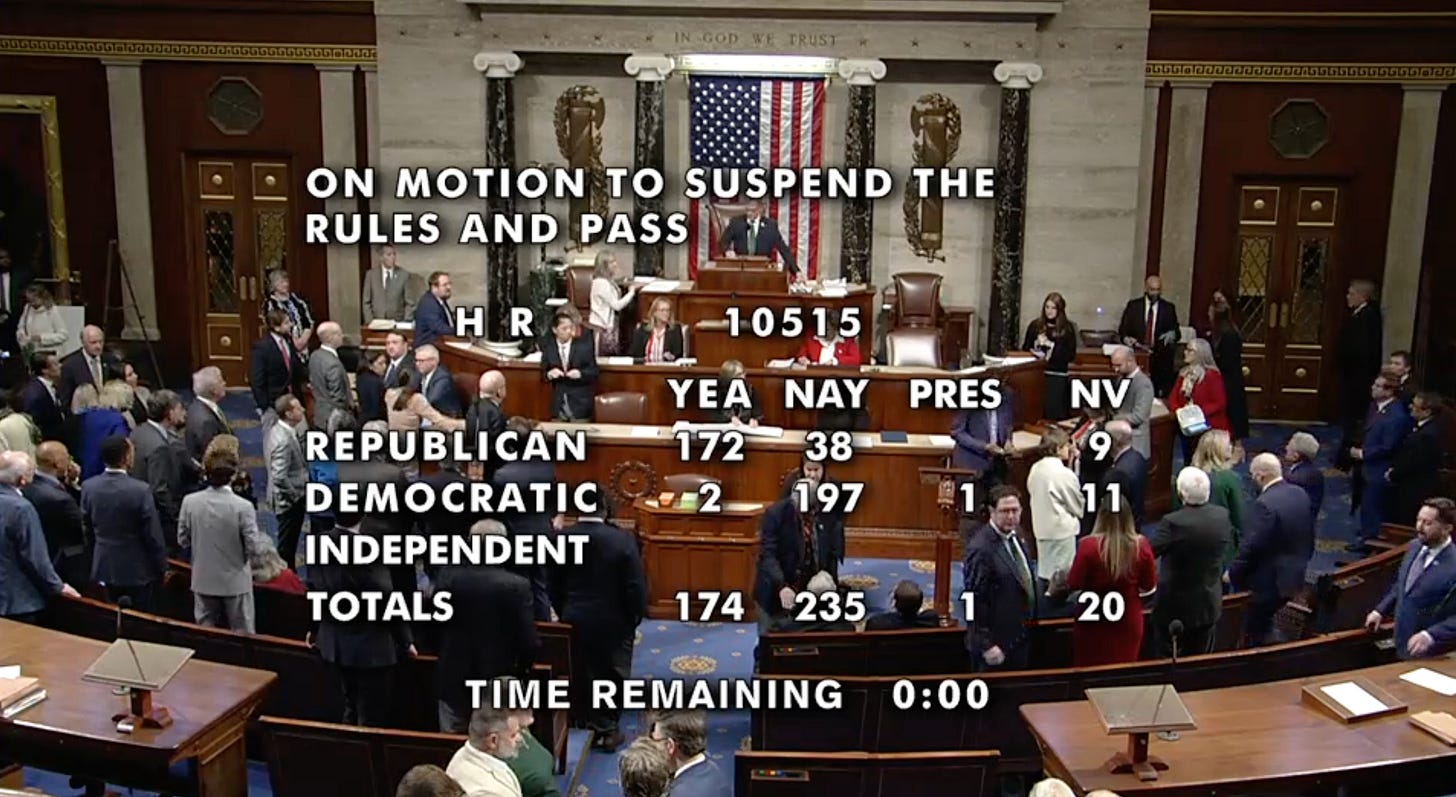Mike Johnson Has Reached a Dead End
Plus: Here’s what did get done this week!
Good morning! It’s Friday, December 20, 2024. Inauguration Day is 31 days away.
I’ve said before that the twin themes of this newsletter are function and dysfunction: explaining when, why, and how the government works — and when it doesn’t.
This week, there’s obviously a lot of dysfunction to report: I’ll have everything you need to know about the looming shutdown deadline below. (Short version: 🤷♂️🤷♂️🤷♂️)
But, even while they scrambled to fund the government this week, lawmakers actually accomplished a surprising amount at the same time. And this wouldn’t be Wake Up To Politics if we didn’t *also* fill you in on those stories, especially since most of them get so little coverage elsewhere. Keep scrolling to learn about the function as well.
But first, we’ll start here: At midnight tonight, the United States government will cease to be funded. Unless Congress intervenes, non-essential government operations will shut down. Hundreds of thousands of employees will be furloughed; hundreds of thousands more will be required to work without pay. Agencies are already preparing for the possibility.
House Speaker Mike Johnson’s (R-LA) original plan to avert the shutdown was the Further Continuing Appropriations and Disaster Relief Supplemental Appropriations Act, a 1,547-page deal negotiated with Democrats to keep the government open through March 14 and accomplish a bunch of other bipartisan priorities at the same time.
But then President-elect Donald Trump — with an assist from Elon Musk, who said it included too many extraneous provisions — put the kibosh on that proposal, sparking a revolt from House Republicans.
Johnson unveiled his Plan B yesterday: the American Relief Act, a much slimmer, 117-page bill that would have also funded the government through March. Most of the original bill’s add-ons were stripped out, although some parts remained, including $110 billion in disaster relief, a one-year extension of federal farm programs, and funding for certain expiring health care policies.
Importantly, the measure also would have suspended the debt ceiling until 2027, heeding an unexpected demand of Trump’s. (Actually, he had called for the limit on borrowing to be entirely abolished.) The president-elect quickly gave the bill his blessing.
But there was a reason Johnson’s first instinct had been to strike a deal with Democrats rather than his own rank-and-file: the slim House Republican majority is famously fractious, and includes a sizable segment who almost always balk at approving stopgap funding bills — and especially don’t like raising the debt ceiling — even when it means bucking against Trump.
Last night, Johnson put his new package up for a vote under suspension of the rules, which means it needed two-thirds support. It didn’t even win a simple majority, going down 174-235. 38 right-wing Republicans broke with Trump by voting against the package; so did all but two Democrats, refusing to budge from their original deal.
So, what will Plan C be? No one knows, even as the clock ticks towards a shutdown.
After his bill was rejected on the floor, Johnson is now back to the drawing board.
But his options are the same as they were before: he either has to return to brokering a deal with Democrats, find a package that can win 218 members of his conference (and also pass the Democratic-led Senate), or accept his fate and march into a shutdown.
It has been an embarrassing 48 hours for the GOP: a perfect encapsulation of the last two years of chaotic House Republican rule — and, alarmingly for Trump, a sign that the stark divisions within the conference will not ease once the party claims full power one month from today.
Until this episode, Trump had been riding high since the election; now, not only may he be sparking a government shutdown — which tend not to be popular — but the limits of his influence over congressional Republicans were exposed with Thursday’s vote. (As one example, Trump spent part of the day threatening a primary challenge against one rebellious Republican, Rep. Chip Roy of Texas. Roy responded by voting against the Trump-backed package, insisting that a debt ceiling increase be paired with spending cuts — a position, by the way, that also used to be Trump’s.)
Johnson has come out of the ordeal looking even worse. Once seen as a lock to be re-elected speaker in January, his handling of the funding situation has lost him a lot of goodwill among his right-wing members. He also seems to have lost Trump’s full-throated support, which was previously his best weapon in Republican circles.
As Trump should have learned in 2019, when he presided over the nation’s longest-ever shutdown (and got little to show for it), politicians who gamble with government funding rarely come out the other side looking like a winner. This clash shows no signs of becoming an exception.

OK, enough dysfunction. Let’s talk about function.
Even with the funding breakdown, Congress actually got a lot done this week — and much of it with bipartisan support. Here are eight bills that the House and Senate sent to the president’s desk this week:
Three packages that cleared Congress with big majorities
1) The National Defense Authorization Act (NDAA), the annual defense policy bill, passed the House, 281-140, and the Senate, 85-14. Taking up a mere 1,778 pages, the package authorizes $895 billion in defense spending for the next fiscal year,1 including a record 14.5% pay raise for junior enlisted service members, a 4.5% raise for other service members, $3 billion to improve military housing, increased support for Israel and Taiwan, and a ban on the military’s health insurance covering transition-related care for transgender minors.
2) The Water Resources Development Act (WRDA), a biennial package authorizing new Army Corps of Engineers water infrastructure projects, passed the House, 399-18, and the Senate, 97-1. The measure authorizes 22 new projects and commissions studies on over 200 more, including efforts to improve the nation’s ports and harbors and increase protections against flooding.
3) The Senator Elizabeth Dole 21st Century Veterans Healthcare and Benefits Improvement Act passed the Senate unanimously last week and the House, 382-12, this week. The package will create a stipend to help homeless veterans purchase food and other necessities, give aging veterans increased flexibility to access care at home, and fund mental health counseling for veterans’ home caregivers, among a raft of other provisions.
A bipartisan boost for teachers and firefighters
4) The Social Security Fairness Act advanced in the Senate, 73-23, after passing the House, 327-75, last month. The measure would get rid of the Windfall Elimination Provision (WEP), which reduces Social Security benefits for people who receive both a pension from a public sector job and Social Security benefits from a private sector job.2 (This one technically hasn’t been sent to the president’s desk yet, but the Senate will hold a final vote on it soon.)
The bill’s backers argue that the WEP unfairly penalizes about 2 million former public servants who paid Social Security taxes while in a separate private sector job, but now aren’t receiving the full benefits they worked for. Its opponents note that the measure would add $196 billion to the deficit over the next 10 years — at a time when Social Security is already running out of money. (It’s estimated that the legislation would accelerate the program’s insolvency by about six months.)
Be that as it may, it’s usually not good politics to prevent more money from going to teachers and firefighers, and this bill has been one of the most broadly supported on Capitol Hill for years. (I first covered it back in 2022.) It’s had a winding legislative journey — even featuring a rare use of the discharge petition, a tool that allows bills to reach the House floor without leadership approval if a majority of members sign on. With support from both Democrats and Republicans, the measure became only the fourth to successfully marshal a discharge petition this century.
Congresswoman Paris Hilton?
5) The Stop Institutional Child Abuse Act passed the House in a 373-33 vote, after passing the Senate unanimously last week. The bill aims to prevent the abuse of minors at rehab and other residential treatment facilities, by conducting a study on the “nature, prevalence, severity, and scope” of the issue and disseminating recommendations to address it.
Paris Hilton — who has spoken about being abused at such programs when she was a teenager — has spent months lobbying for the bill: testifying before Congress, joining lawmakers at press conferences, and even musing about running for office herself. She is also now selling a “Legislation Is Hot” hoodie ($54.99, with proceeds going to her nonprofit combatting child abuse). Here at Wake Up To Politics, we proudly approve that message.
Sorry to the next George Santos!
6) Currently, when former members of Congress are convicted of a felony, they lose their pension — but only after they’ve exhausted the appeals process, which can sometimes mean years of receiving payments post-conviction.
The NO CORRUPTION Act, which passed the House unanimously this week (and the Senate last year), would change that, revoking pensions immediately after conviction if an ex-lawmaker has been found guilty of charges related to their official duties.
🦅🦅🦅🦅🦅🦅🦅🦅
7) Did you think the bald eagle was America’s national bird? Think again! At least officially, the country has never had one. That’s about to change, after the House and Senate unanimously approved S.4610, which would formalize the designation. The bald eagle will join other national symbols like the rose (America’s national flower), the bison (our national mammal), and the oak tree (the national tree).
More judges, more justice
8) Remember the JUDGES Act, the bipartisan bill that would have created 63 new district court judgeships (over 11 years) in order to address America’s deep backlog of court cases? As I covered last week, that measure is expected to be vetoed by President Biden.
But the judiciary will receive some — smaller — amount of relief via the Federal Judiciary Stabilization Act, which passed the House unanimously this week after a unanimous Senate vote in April. Under the measure, 10 temporary district court judgeships (all of which were set to expire) will now be made permanent, bringing the number of permanent district court judges from 667 to 677.
And there’s more…
✍️ Congress also sent bills to the president’s desk funding Holocaust education and programs targeting child sexual abuse and Native American child abuse; reforming the federal hiring process; requiring Amtrak to increase accessibility for people with disabilities; reauthorizing conservation and autism research programs; preventing abuse of federal working dogs; combatting fentanyl; and naming a post office for Dianne Feinstein.
✅ The Senate also passed bills boosting small police departments, tribal law enforcement, and broadband at national parks; ensuring that Americans’ credit won’t suffer if they’re held hostage abroad; strengthening penalties for individuals who commit violent crimes on behalf of foreign adversaries; and creating a national historical park honoring César Chávez.
✅ The House also passed bills closing campaign finance loopholes; combatting human trafficking; removing financial barriers for organ donors; granting long-sought federal recognition to a Native American tribe; creating a Jackie Robinson Ballpark National Commemorative Site; and allowing for a Congressional Time Capsule to be buried at the Capitol for the country’s 250th birthday.
An important distinction to remember: on Capitol Hill, most bills (like the NDAA) are authorization bills, which give programs the legal authority to exist — but don’t actually fund them, even if they recommend funding levels. Only appropriations bills can actually distribute money. (To bring this full circle, Congress has to do what it’s doing right now — try to pass a stopgap funding bill — because lawmakers failed to pass any of the 12 appropriations bills by the start of the fiscal year.)
There’s also a related provision called the Government Pension Offset (GPO), which reduces Social Security benefits for individuals who receive both a public sector pension and Social Security benefits through their spouse’s private sector job. That provision impacts about 720,000 people, and this bill would repeal it, too.






The #DirtyOldMan and his giant man baby Elon will have a government of the money, by the money, and for the money. Thanks for this report.
The government will shut down and Trump, Musk, and the MAGA minions are gonna blame Johnson for not having leadership qualities and dems for not supporting either bill. They always move the goalposts to avoid blame. Johnson is toast and I hope the public know who to blame instead of what is being fed to them by the right wing echo chamber.